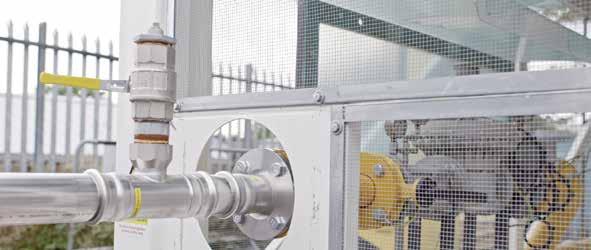
5 minute read
Green Tech 12
With any cultural changes, we often look to business leaders around the world to make the first moves, trial new concepts and pave the way for the smaller players in the game. The sustainability shift seen by this generation is no different.
Individuals can make small changes which will have a big impact, but businesses have the ability to make important changes that can alter our direction of travel for the better.
Advertisement
On average, we spend over one-third of our lives at work and so understandably become products of our surroundings. Many of our habits and traits can be attributed to our workplace environments, presenting an important opportunity for businesses.
Being or working towards becoming ESG compliant is now an expected policy for most businesses, but the work shouldn’t stop there. We need to look at what other impactful changes are available through the workplace.
Business is about people and they should work with their people to help them make better sustainable choices, both in and outside of work. To have the ability to influence a cultural change for the better is the opportunity many would wish for, but few get the chance to do and one that should be made the most of.
It can’t be a one-way dialogue; we aren’t going to progress with actual impactful changes if we don’t work with our people and educate where we can. Small changes made on a big scale can have huge results.
Simply introducing the plastic bag charge and encouraging reuse water bottles has massively reduced plastic waste. Operating a recycling policy in offices and limited printer use saves paper and in turn, trees. But what do these policies have in common? They aren’t board level operations or executive procedures; they are simple everyday occurrences which involve people making better choices to protect our planet and improve sustainability. The important thing to note is, it is about education and behavioural changes. These people are more likely to reuse their water bottle outside the office too, recycle at home and carry a shopping bag with them. The goal should be to make changes in business that are achievable for people to replicate in their everyday life as well.
Businesses carry out many ESG decisions and operations on a high-end scale which massively influences climate change and sustainability, but we cannot overlook the opportunity available to educate at a grassroots level and help people understand their individual impact.
Initiatives like providing Wizso tablets in workplace toilets is a perfect example of this. The product is simple. A small eco-friendly tablet is released from a dispenser into the user’s toilet bowl before or after taking a pee. It reacts on impact with the water, delivering a fresh smell while changing the colour and leaving it recognisably clean, thus giving the user the confidence not to flush. A simple concept with huge results.
Each time it is used, and the toilet hasn’t been flushed, we save approximately 7.5 litres of fresh water and approx. 5 grams of carbon from being emitted. Rolling out an initiative like Wizso could begin in the office but be easily replicated at home. With the water shortage and cost of living crises currently front of mind, we need to apply concepts whereby a simple change by an individual can actually have a massive impact on climate change and family finance.
Who is responsible for our planet and its sustainability? The answer is twofold: businesses and people. The challenge is to make the most of the relationship between the two to bring about the cultural and behavioral changes so desperately needed to improve our sustainability performance.
MARK GILLIGAN
Director, Wizso
wizso.com
Wizso is a eco-friendly tablet which leaves toilet water smelling fresh and clean after a pee, so users don’t have to flush every time.

SIEMENS CONGLETON TO HIT CARBON NEUTRAL TARGET – EIGHT YEARS EARLY!

Siemens’ Congleton factory is set to achieve carbon neutrality this year - eight years ahead of its original target.
OLIVIA WHITLAM
Head of Sustainability, Siemens Plc
ANDREW PETERS
Managing Director, Siemens Digital Industries Congleton
FAYE BOWSER
Head of Siemens’ Energy & Performance Services GB&I
The operation, which manufactures over 1.2m controls and drives per year, has deployed a range of sustainable solutions for energy generation and demand with support from Siemens’ energy and performance services business, Smart Infrastructure.
These include generating 75kw of renewable energy through a hydro-electric plant at Havannah Weir on the River Dane and using carbon neutral certified biogas to power its on-site gas engine. These measures alone saved over £250,000 pounds a year and took the 80% powerindependent factory off the grid.
Siemens Congleton also adopted a building management system which automatically drives energy efficiency improvements, and modern windows and LED lighting have reduced the total energy bill by 13% and 30% respectively. Combined with reducing waste to landfill to zero and EV charging for staff and visitors, the Cheshire site is eight years ahead of Siemens’ original 2015 commitment to ensure carbon neutral operations by 2030.
Andrew Peters, Managing Director of Siemens Digital Industries Congleton, said: “Siemens believes that sustainability is a force for good and can deliver value for all its stakeholders. We want to help customers achieve sustainable growth and to transform their industries through decarbonisation. The first step of that is for us to achieve these ambitions in our own operations.”
The 50-year-old Siemens Congleton factory began its sustainability journey in 1990 when it started manufacturing drives for industry. In 2018 the factory became fully digital through lean manufacturing methods to achieve continuous improvement and by adopting leading-edge Industry 4.0 processes.
The biogas generator at Siemens Congleton.











